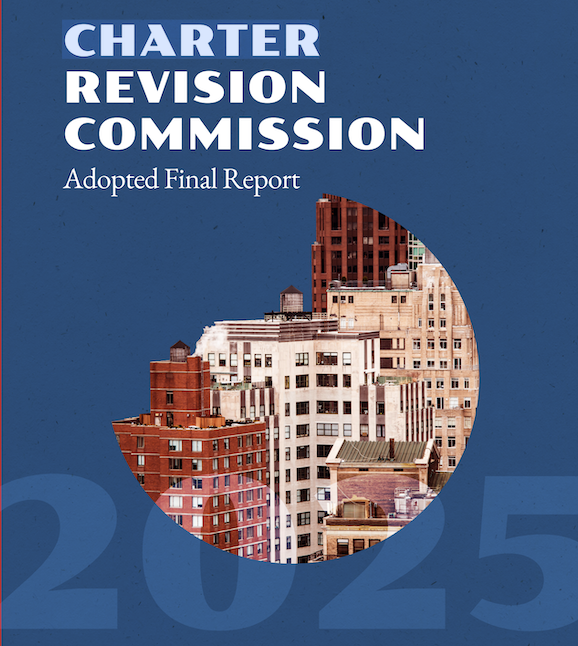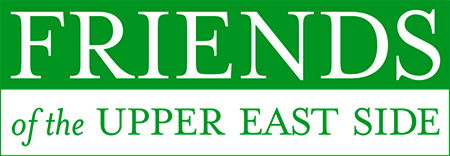
Image: NYC Charter Revision Commission Adopted Final Report
This November, New Yorkers will not only vote for elected officials—they will also decide on a series of ballot measures that could significantly expand mayoral authority and reshape longstanding mechanisms for community oversight in the city’s land use and development process. Behind the bureaucratic language of “streamlining” and “fast-tracking,” the Mayor’s Charter Revision Commission is advancing a dangerous agenda: weakening public input and consolidating control over land use decisions that shape every block, building, and future in this city. These proposals do not address the root causes of the housing crisis. Instead, they seek to limit and marginalize public participation—raising serious concerns about transparency, accountability, and democratic governance.
In July, the Commission—handpicked by Mayor Eric Adams—approved its final report, which includes five ballot questions set to go before voters this fall. While framed as tools to galvanize support for and facilitate more affordable housing, several of these measures are Trojan horses for deregulation and reduced public review oversight. If passed, essential guardrails like ULURP (Uniform Land Use Review Procedure), community board review, and City Council oversight could be curtailed, bypassed, or sidelined—giving developers more leverage and New Yorkers less say.
FRIENDS has closely monitored this process and consistently voiced strong opposition during public hearings to any proposals that would reduce public oversight. We continue to emphasize that transparency, accountability, and community engagement are essential to responsible and effective urban planning process. Read FRIENDS’ testimony urging the commission to preserve robust safeguards for public input to ensure a more equitable and sustainable future for the city.
As these critical issues head to the ballot, FRIENDS urges the community to remain informed and engaged. Below are the relevant ballot questions, along with our recommendations:
QUESTION 2: Fast Track Affordable Housing Across the City
Creates a new process at the Board of Standards and Appeals for zoning relief and a separate “streamlined” review for districts with lower affordable housing production. More specifically, certain projects in the 12 community districts with the least affordable housing would skip City Council review and go directly to the City Planning Commission, though community boards and borough presidents would still review them. This proposal also allows some publicly funded affordable housing projects bypass the full ULURP process and seek zoning relief through the Board of Standards and Appeals instead. This proposal sets a precedent for circumventing public review under the guise of equity. It centralizes decision-making without requiring greater affordability or stronger tenant protections. FRIENDS recommends a NO vote.
QUESTION 3: Simplify Review of Modest Housing and Infrastructure Projects
Introduces a new review pathway called the Expedited Land Use Review Procedure (ELURP) for many smaller projects. These include “modest” housing developments that meet specific criteria, as well as certain rezonings, land acquisitions, and infrastructure projects. The local community board and borough president would still provide input, but their review periods would happen concurrently rather than one after the other. Final approval would rest with the City Planning Commission, unless state law requires City Council involvement. This is another step toward dismantling the ULURP, which gives communities a voice. “Modest” is undefined—opening the door to broad exemptions from public engagement. FRIENDS recommends a NO vote.
QUESTION 4: Create an Affordable Housing Appeals Board
Establishes a new appeals board made up of the mayor, the local borough president, and the City Council speaker. The board would review Council decisions that reject or modify applications for affordable housing. Currently, under the ULURP process, the mayor can veto Council actions, though the Council can override the veto with a two-thirds vote. The new appeals board could overturn Council decisions if at least two of its three members agree. This dilutes Council power and inserts mayoral influence into what should remain a transparent legislative process. It risks replacing public deliberation with backroom deals. FRIENDS recommends a NO vote.
QUESTION 5: Create a Digital City Map
Consolidates and digitizes the city’s archive of paper maps under the Department of City Planning. While modernization is essential, FRIENDS is closely monitoring how these changes might impact the City Map’s existing role in infrastructure approvals. Broader implications and oversight of the data remain unclear. FRIENDS takes no position at this time, stay tuned.
QUESTION 6: Move Municipal Elections to Coincide with Presidential Years
This proposal would shift city elections, including mayoral and City Council primary and general races, to align with presidential election years, but only when allowed by state law. FRIENDS takes no position at this time, stay tuned.
FRIENDS Stands Firm Against This Power Grab!
We support fair and affordable housing, and the right of communities to participate in decision-making but we oppose changes that weaken local voices and leaders, and diminish transparency in the name of efficiency or expediency. This is not just about housing policy. This is about who gets to decide what our city looks like. This is about you.
Stay informed. Stay involved. And this November, vote to protect your voice in shaping New York’s future.

